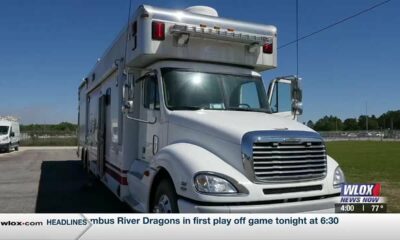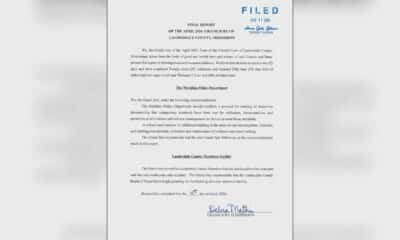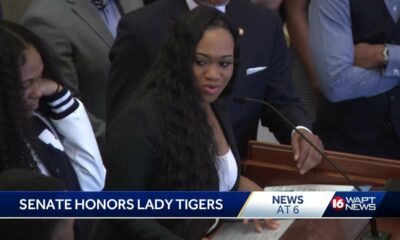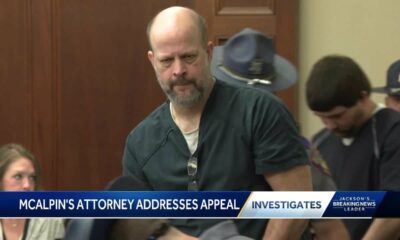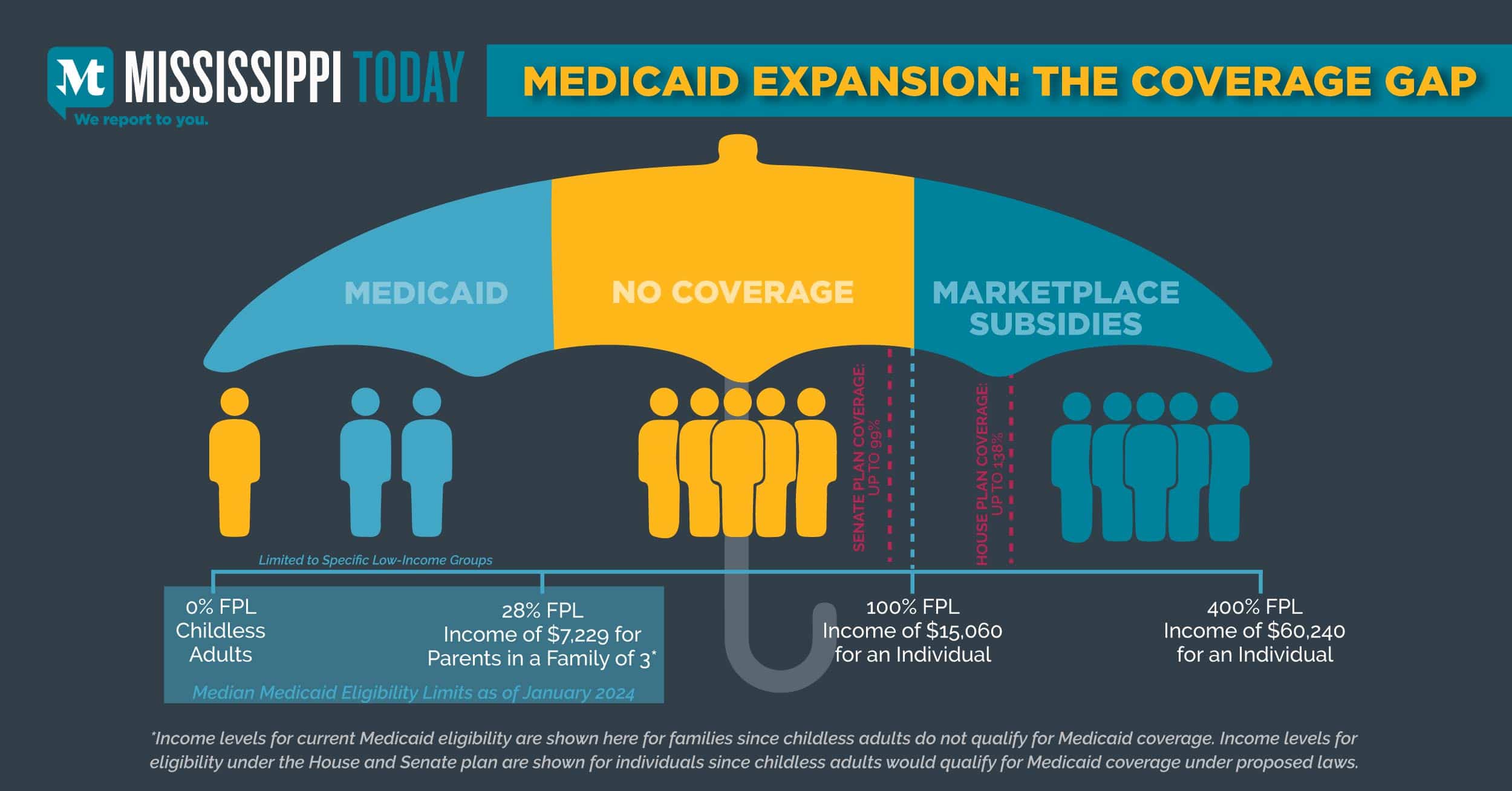Mississippi Today
Welfare case judge shoots down Brett Favre’s attempts to dismiss charges
Welfare case judge shoots down Brett Favre's attempts to dismiss charges
In her first major order in the ongoing welfare fraud case, Hinds County Circuit Court Judge Faye Peterson denied former NFL quarterback Brett Favre's attempt to dismiss civil charges against him.
Peterson also blocked Favre's request for a hearing on his motion, saying it was unnecessary and calling his legal arguments “unpersuasive and inapplicable.”
Mississippi Department of Human Services is currently targeting 47 defendants whom it says fraudulently transferred nearly $80 million in funds from the federal Temporary Assistance for Needy Families program, or TANF.
Favre had argued that he never committed his own funds to build a volleyball stadium at the University of Southern Mississippi, a project eventually completed with $5 million in federal welfare funds, and that the state fully approved of the transfer.
“If, as MDHS falsely alleges, Favre was part of a conspiracy, it was the most public and open conspiracy in Mississippi history, it was directed and carried out by MDHS itself to transfer funds from one public state entity to another, Southern Miss, and it was vetted and approved by numerous lawyers and State officials,” his attorneys wrote in his motion to dismiss.
Peterson said in her motion Monday that Favre's argument that MDHS “failed to allege that Favre formed an agreement with anyone to do anything unlawful” was “without merit,” effectively keeping Favre in the suit. Favre has not faced criminal charges in the U.S. Attorneys Office's parallel criminal case, which just saw the addition of former WWE wrestler Teddy DiBiase Jr. last week.
“Obviously Brett Favre is disappointed in the court's ruling. His legal team is exploring their options,” a spokesperson for Favre said in a statement Monday.
The judge also said that while Favre laid out a lengthy narrative with 300 pages of exhibits in his motion, under court procedure, she was not able to consider his version of facts.
The order Monday marks the first time Peterson, who wields great control over the trajectory of the civil suit, has directly acknowledged in a court filing the state's allegations of civil conspiracy and fraudulent transfers against Favre.
“Both claims stem from allegations surrounding his involvement with and dealings to secure funding for the constriction of a brick-and-mortar volleyball facility at the University of Southern Mississippi as well as allegations surrounding his efforts to secure funds for a for-profit drug company, Prevacus,” she wrote. “Specifically, Plaintiff alleged that Favre personally guaranteed funds for the construction of a volleyball facility at USM, that he was unsuccessful at fundraising efforts, that he conducted months of negotiations and backdoor meetings with other named defendants and the University of Southern Mississippi Athletic Foundation to acquire funding, that the funding came from TANF funds and that said were used of non-TANF purposes, i.e. construction of a volleyball facility. Plaintiff further alleged that Favre, as the largest individual outside investor of Prevacus, engaged in similar meetings to assist in similar procurement of TANF funds that were, then, used to purchase stock in Prevacus, inconsistent with lawsuit TANF purposes.”
Peterson has filed 32 orders in the civil suit, which MDHS initially filed in May of last year. Until her order Monday denying Favre's motion, Peterson had issued only procedural motions, such as granting time extensions for defendants file replies or allowing a defendant to use an out-of-state attorney.
The judge also has yet to hold a public hearing in the case.
Several other defendants have filed motions to dismiss, including Prevacus and its founder Jake Vanlandingham, nonprofit founder Nancy New, her sons Zach New and Jess New and their related companies, nonprofit director Christi Webb, former WWE wrestler Ted DiBiase Sr., former football player and fitness trainer Paul Lacoste, virtual reality company Lobaki, lobbyist and former state senator Will Longwitz, state contractor and former Attorney General's Office employee Nick Coughlin and the former welfare director's nephew Austin Smith. Peterson has not issued orders on their motions.
This article first appeared on Mississippi Today and is republished here under a Creative Commons license.
Mississippi Today
Mississippi Capitol sees second day of hundreds rallying for ‘full Medicaid expansion now’

Hundreds of people rallied at the Mississippi Capitol for a second day Wednesday, urging lawmakers to expand Medicaid to provide health coverage for an estimated 200,000 Mississippians.
After faith leaders spoke at the Capitol on Tuesday, Care4Mississippi, a coalition of advocates, held a rally Wednesday. Speakers recounted their struggles with access to affordable health care in Mississippi and chanted for the Legislature to, “Close the coverage gap now,” and for “Full Medicaid expansion now.”
Stephanie Jenkins of McComb, a former social worker, lost her job and health insurance after a car wreck left her with debilitating injuries.
She said she later received some medical treatment from the University of Mississippi Medical Center, but still suffers from chronic pain and other ailments. She said she was told she could not receive Medicaid coverage because she owns too much property.
Jenkins said that years after her accident, “I'm still fighting that battle. I'm still trying to get health insurance. I am still trying to get Medicaid … The state of Mississippi does not realize that it is not about money. It is not about race. It is about people. People are dying because they have no health insurance.”
Dr. Randy Easterling, a Vicksburg family physician and former executive director of the Mississippi Medical Association, spoke in favor of Medicaid expansion. He said the people who would be helped by the expansion primarily work at jobs that do not provide health care and they do not earn enough to purchase private insurance. Many are small business owners.
Easterling said often times the insurance policies available through the federal marketplace exchange have out-of-pocket costs that make them unaffordable for working people if they get sick.
Easterling recounted a story of two of his friends diagnosed with similar cancers. One was uninsured and self-employed, and did not get early diagnosis or treatment. He's now in hospice and on death's door. The other friend, with insurance, received an early diagnosis and treatment and is now cancer free.
“This is a matter of life and death. It is certainly more than a political debate,” Easterling told the crowd.
But the issue of expanding Medicaid is currently engulfed in the political process of the Mississippi Legislature. The House has passed a bill to expand Medicaid as is allowed under federal law to cover those earning up to 138% of the federal poverty or about $20,000 annually for an individual. Under the House plan, the federal government would pay 90% of the health care costs and provide the state with almost $700 million more over the first two years as incentive to expand Medicaid as 40 other states have done.
READ MORE: Experts analyze House, Senate Medicaid expansion proposals, offer compromise plan
Under the Senate plan, coverage would be provided to working people earning less than 100% of the federal poverty level and the federal government would pay much less of the costs.
Studies indicate that the Senate plan would cost the state more and cover fewer people. At the rally, people wore yellow T-shirts that read, “close the coverage gap” and “leave no one behind.”
Easterling said that by refusing to expand Medicaid for the last 11 years, “This state has struck a match to $12 billion … and that money was earmarked specifically to increase access to health care.”
He added, “Two days ago most of us wrote a check to the IRS. Now explain to me in simple terms, I am pretty simple, why my (federal) tax money in Mississippi went to increase access to health care in 40 states and not any of it came back to Mississippi.”
“We take federal money right and left,” Easterling said. “We take hundreds of millions of federal dollars for highways, education, the Health Department, law enforcement and natural disasters … But for some reason we push back on additional money for health care. I would submit to you this is a matter of life and death.”
Robin Y. Jackson, with the Mississippi Black Women's Roudtable, told of dropping out of school to care for a family member. In the process she developed a chronic health problem. She said she was unable to get help, but later got a job with health insurance even though her employer knew she had costly medical maladies. After surgeries costing tens of thousands of dollars, she said she is finally well.
“I was lucky,” she said. Others are not so lucky. She said with Medicaid expansion everyone could receive the treatment she was lucky enough to receive.
She said as shepherds of Mississippians, politicians should strive “to leave no one behind.”
Sonya Williams Branes, a former legislator, a small business owner and state policy director for the Southern Poverty Law Center, recounted the struggles she faced with her young son who had chronic asthma. As a small business owner at the time, she struggled to provide health care for her family and her employees.
“To ensure my son remained eligible for CHIP, a program that provided him with vital medical care, I was forced into a corner,” Barnes said. “Making more money, expanding my business and hiring more staff – all paths to improving our lives – would disqualify him from the program, pushing essential health care out of reach.
“Our system is broken,” Barnes said. “It punishes ambition and stifles growth.”
Before the Care4Mississippi rally, the Legislative Black Caucus on Wednesday morning held a press conference calling for adoption of the House's more expansive Medicaid coverage plan.
“We remain committed to having full expansion and covering as many working Mississippians as possible,” said House Minority Leader Robert Johnson, D-Natchez. “Our goal is to sustain health care in Mississippi and sustain it in a way that it doesn't matter where you live or what your income is.”
This article first appeared on Mississippi Today and is republished here under a Creative Commons license.
Mississippi Stories
Mississippi Stories: Natalie Moore
Mississippi Stories: Natalie Moore
In this episode of Mississippi Stories, Mississippi Today Editor-at-Large Marshall Ramsey sits down with Natalie Moore, Peer Wellness Support Services Coordinator for the Mississippi Mental Health Association. Moore and Ramsey share their experiences battling mental health issues and the Congregational Recovery Outreach Program's upcoming mental health summit.
CROP is a faith-based, grant program that aims to help individuals recovering from substance use disorders and mental illnesses.
This article first appeared on Mississippi Today and is republished here under a Creative Commons license.
Mississippi Today
On this day in 1863
April 17, 1863

As darkness fell on San Francisco, a young Black woman named Charlotte Brown walked a block from her home on Filbert Street and took a seat on the “whites-only” horse-drawn streetcar.
She and her family had moved to California from Maryland, a part of the city's burgeoning Black middle class. Her father, James E. Brown, was an anti-slavery crusader and was a partner in the Black newspaper, Mirror of the Times.
When the conductor came to collect tickets, she handed him the ticket she had purchased, only for him to refuse to take it.
“He replied that colored persons were not allowed to ride,” she later testified. “I told him I had been in the habit of riding ever since the cars had been running. I answered that I had a great ways to go and I was later than I ought to be.”
The conductor asked her several times to leave. Each time she refused. When a white woman objected to her presence, the conductor grabbed her by the arm and forced her off the streetcar. She boarded twice more with the same result and sued.
Two years later, a jury awarded her the huge sum in her day of $500 (streetcar tickets were just 5 cents), and a judge ruled that barring passengers on the basis of race was illegal. He wrote in his ruling that he had no desire to “perpetuate a relic of barbarism.”
Her victories paved the way for the official end of racial discrimination on streetcars in San Francisco and beyond.
This article first appeared on Mississippi Today and is republished here under a Creative Commons license.
-
Mississippi News4 days ago
Mississippi will soon be bombarded with cicadas
-
SuperTalk FM2 days ago
4 tornadoes touched down in Mississippi during latest round of severe storms
-
SuperTalk FM3 days ago
2 Jones County correctional officers arrested in smuggling bust
-
Mississippi News5 days ago
Columbus schools may see needed upgrades with bond issue
-
Local News3 days ago
Almost 3,500 Mississippi Veterans have enrolled in VA health care in past 365 days, 28% increase over last year
-
SuperTalk FM12 hours ago
Chance of parole denied for man who killed 3 Choctaw Indian tribal members
-
SuperTalk FM6 days ago
Explosion at elementary school in Mississippi Delta hospitalizes two employees
-
SuperTalk FM2 days ago
Amazon project in Madison County to be over $10B, create more jobs than projected: report


